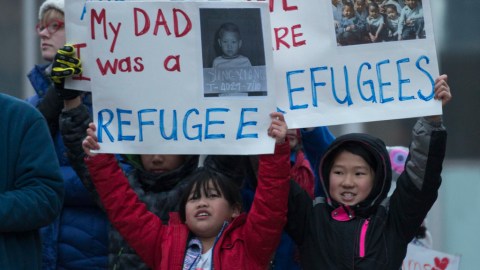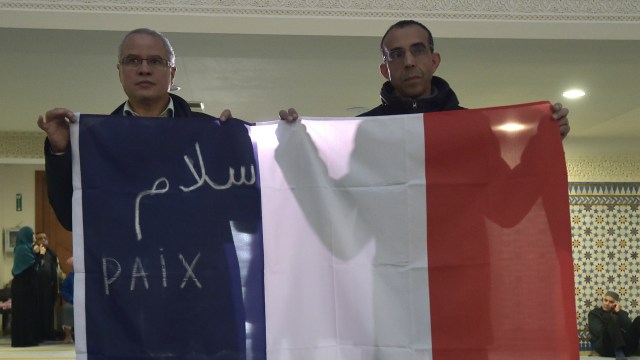Treating Syrian Refugees Like ‘Mad Dogs’: Fear Readily Trumps Morality and Reason

When you look in the mirror, who do you see? Beyond the imperfections everybody notices first — the wrinkles or receding hairline or zits — you see someone who is your gender, your age, your skin color. And when you think of yourself in your mental mirror, who do you think you are? In part, you see yourself as someone who lives where you live, who does what you do for a living, a person who ascribes to one religion or another (or none), has a particular cultural background, and who identifies with certain values and with the people and groups who share them.
These and other characteristics give you a sense of yourself. And that sense of who you are, and who you are like, is critical for your safety and survival. It tells you who is in your tribe, and who isn’t; who is on your side and who isn’t; who is likely friend and who is possible foe.
That sense of tribal identity and belonging is absolutely vital to the safety of social animals like us, creatures who have evolved to depend on our group — our tribe — for our well-being and protection. It’s central to how safe, or unsafe, we feel. When we’re scared, we band together in the tribes we most closely identify with, and far more readily treat anyone else as the enemy.
This inherent truth of human cognition explains a great deal about our response to the terror attacks in Paris, in particular the fear of Syrian refugees. None of the attackers in Paris were Syrians. They were French, or Belgian, although two apparently snuck into Greece posing as refugees. But they all had Middle Eastern backgrounds, and several had visited or lived in Syria. So they are being lumped together — as Syrians — into a tribal response that fears “others” who come from “there” and who “look like that.”
Republican presidential candidates want to keep Syrian refugees out of America, or drastically increase screening, even though for years screening of refugees has been far more rigorous than for any category of people trying to enter the country.
This is the underlying reason why mayors, prominent police officials, and nearly 30 American governors want to bar entry of Syrian refugees into their communities. One mayor said banning Syrians is as justified as what the United States did in World War II, rounding up Japanese-Americans and interring them in prison camps, an ugly tribal reaction born out of fear that left a deep stain on America’s moral character.
The U.S. House of Representatives has voted to require new, nearly impossible-to-meet screening standards for Syrian and Iraqi refugees. The language of one representative, Steve King of Iowa, illustrates how fear makes us tribal and bigoted.
“Filling your country up with people who have a completely different belief system (my emphasis) … and expecting they won’t rise up against their benefactor is foolish.”
Republican presidential candidates want to keep Syrian refugees out of America, or drastically increase screening, even though for years screening of refugees has been far more rigorous than for any category of people trying to enter the country. New Jersey Governor Chris Christie thinks this ban should include all Syrians, even young children orphaned by war, which is far more a tribally bigoted response to fear than an intelligent way to protect public safety.
So are the proposals of candidates Jeb Bush and Ted Cruz, who want to bar all Syrian refugees except if they are Christian.
Cruz: “There is no meaningful risk of Christians committing acts of terror.”
Bush: “There are a lot of Christians in Syria that have no place now. They’ll be either executed or imprisoned, either by [Syrian President Bashar al-Assad] or by ISIS.”
Why are Syrian Christians safe? They are members of Bush’s and Cruz’s tribe, so they aren’t seen as a threat.
One Republican presidential candidate, Dr. Ben Carson, a black man, takes his tribal bigotry born out of fear even further, likening some Syrian refugees to mad dogs.
“If there’s a rabid dog running around in your neighborhood, you’re probably not going to assume something good about that dog. We have an American culture, and we have things that we base our values and principles on.” (my emphases)
President Barack Obama, and many others, have called this instinctive, self-protective tribalism “shameful,” “an abandonment of our principles,” and un-American. Wisely, the president encourages that we respond to threats with reason, not just emotion.
“We are not well-served when, in response to a terrorist attack, we descend into fear and panic. … We don’t make good decisions if it’s based on hysteria or an exaggeration of risks.”
Yet even Obama has demonstrated the instinct to identify with the tribe he feels like he (and Americans) belong to when that tribe is under attack. He called the Paris terrorism “an attack on the civilized world.” As in, our world. All of us. But he didn’t call the terrorist bombings in Beirut or Baghdad the day before attacks on all of us, nor the terrorist bombing of the plane-load of Russians a few days earlier. Those victims were from other worlds, other tribes. The threat to them doesn’t feel like as much of a threat to us, as in, the people in the world that Nobel Peace Prize-winner Barack Obama more identifies with.
It would be great to hope that we might see how when we are afraid, we abandon some of the basic moral principles that differentiate our tribe from the tribe of murderous terrorists. It would be great to hope for that kind of rational self-awareness. But it would be naïve.
The fear-driven tribal stigmatization of Syrians is being rejected by a range of religious groups that have spoken out against bigotry directed toward Syrian refugees, from the Jewish Anti-Defamation League to the U.S. Conference of Catholic Bishops to Evangelical Christian agencies like World Relief. And dozens of local and state leaders, and President Obama, are reiterating their welcome of Syrian refugees into their communities and America.
But even this accepting response is just a version of the same instinct — to band together with those in our tribe in the name of mutual protection. Those still welcoming toward Syrian refugees see them as fellow members of the larger general tribe of humanity; the civilized world; our normal, non-terrorist world; a tribe which includes all victims of terrorism, including Syrian refugees forced by war and terrorism to flee their country in the first place.
It would be great to hope that we might learn lessons from how we’re responding to the Paris attacks, to see how fear is driving tribal bigotry and uber-precaution that borders on ignorance and paranoia. It would be great to hope that we might see how when we are afraid, we abandon some of the basic moral principles that differentiate our tribe from the tribe of murderous terrorists.
It would be great to hope for that kind of rational self-awareness. But it would be naïve. This has played out many times before, and it will again and again. Emotions almost always trump reason, and there is no more powerful emotion than fear.
—
Image credits:





